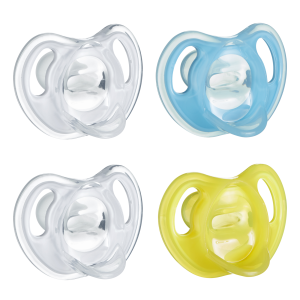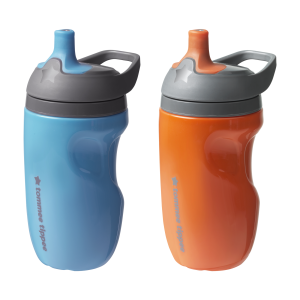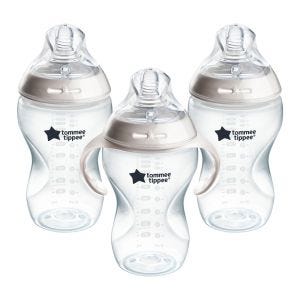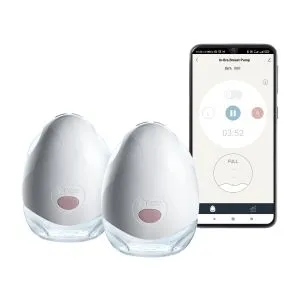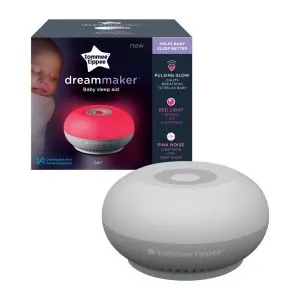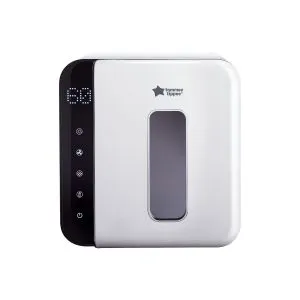
Subscribe to Save
Subscription orders can be cancelled at anytime. Free delivery on all subsequent subscription orders. Find out more about subscriptions.
Why parents love our subscriptions...
-
They’re easy and fuss free
-
Your products are automatically sent to you
-
You save up to 10% when you sign up for a subscription
-
You can cancel at any time

Dreammaker
Great to see that you’ve purchased a Tommee Tippee Dreammaker sleep aid. To help you get started and to keep it working effectively, we’ve added all the guidance you should need.
How does it work?
A scientifically proven sound and light sleep aid that simulates, rather than stimulates. Developed with a world-leading Sleep Laboratory, the DreamMaker™ is a unique, patent-pending device that relaxes your baby, encourages them into a deep sleep and then prolongs the length of their sleep.
From the specific wavelength of the red colored light, to the composition of the audio files themselves, we ensured each decision we made was rooted in science and received have painstakingly matched the optimum performance requirements.
USING THE SLEEP AID
How do I turn it on?
- Connect the provided USB cable to your Tommee Tippee Dreammaker™ and to a compatible adaptor plug. (The USB adaptor plug is not included but the cable is compatible with most USB plugs used as phone chargers.)
- To power on, double tap the inner circle on the top of the device.
- Select Light, Sound and Pulse settings to suit your preferences.
- To power off, simply double tap the inner circle again.

What are the different controls on the unit?

What is pink noise?
A very quiet sleep environment is unfamiliar to babies and may make it harder for them to fall asleep. While in the womb, babies are enveloped in sound, mum’s voice and heartbeat, the rhythmic movement of the digestive system, the oceanic whoosh of breathing and arterial blood flow, and the filtered sounds of the world outside. Pink noise can be found in a heartbeat, the roar of the ocean and the fluctuations of the tide. Every day as we live and breathe, like babies in the womb, we are enveloped in pink noise. Pink noise aids in falling asleep faster, deeper and for longer as it provides baby with a comforting and familiar and more natural background noise in comparison to other noises or no noise at all.
Why do the two pink noises sound identical?
While both are in the pink noise spectrum, one applies a low-pass filter, reducing frequencies greater than 1,000Hz. Infant ear canals are more sensitive than ours and they amplify high frequencies. In other words, what is a negligible difference to us is a big one for babies. The closest comparison is adults with tinnitus, who are also sensitive to high frequencies.
Why red light?
Research has shown that compared to exposure to blue light, which significantly suppresses melatonin, red light exposure has little to no effect on melatonin suppression, the hormone which signals to the body it’s time to start winding down. Red light is also minimally stimulating, in other words, by using red light as a night light, infants (and adults) can drift off in the same way they would in a completely dark room and makes re-settling easier after night-time awakenings.
Why pulsing light?
The rhythmical light waves encourage slow, deep breaths to relax the user ready for sleep. The pulse settings are set to mimic breathing rates. The first, faster pulse reflects baby’s resting breathing rate ~20 breaths per minute (bpm), helping to induce sleep in infants. The second, slower pulse mimics your resting breathing rate, helping you to drift off!
Why are there 3 brightness settings?
With three different levels of brightness you can choose the level you prefer. Following best practice guidelines, we have limited the maximum brightness settings to ensure that the light is comforting and relaxing but does not disturb once asleep.
How can I get my Dreammaker to play pink noise through the night?
To get pink noise to play continuously through the night, you need to press the sound button and make sure the unit’s Crysensor function is switched off. If the unit’s Crysensor is switched on, pink noise will play for 40 minutes, then your Dreammaker will go into listening mode.
WARNING: You should ensure the Dreammaker™ sleep aid and cable is placed at least 3ft away from baby’s cot/bed.

